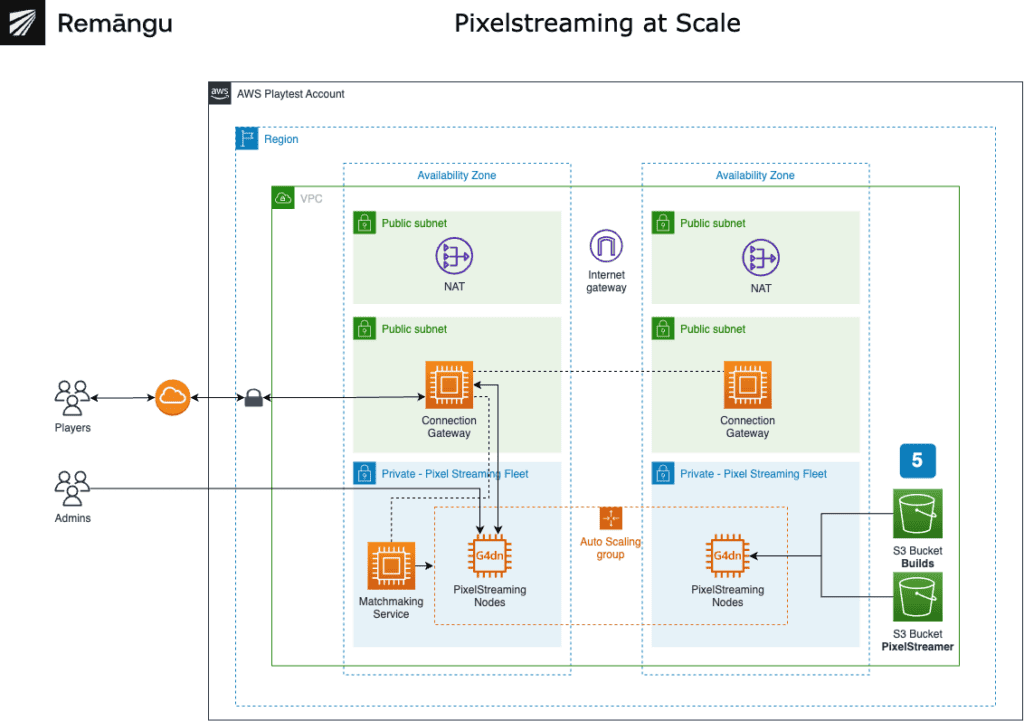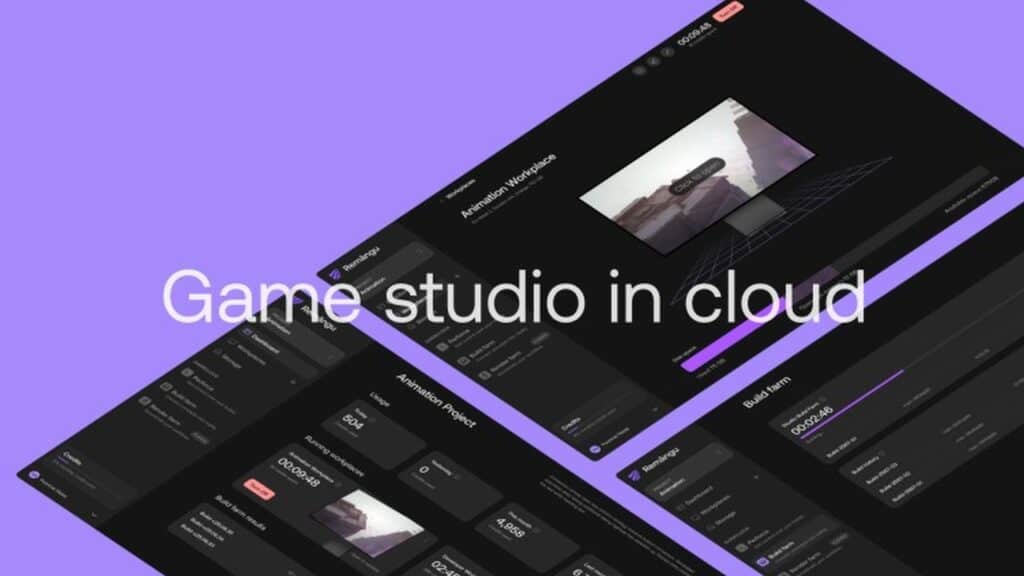Game development is a complex and creative process that requires constant testing and feedback from players. However, due to the pandemic and the social distancing measures, many game developers have faced challenges in conducting playtests and streaming their games to potential customers. After the pandemic ended, we woke up to the new world order and realized that companies continued to work remotely. Of course, this has some challenges as well as benefits.
Of course, we are not without solutions when it comes to remote playtesting.
One of the solutions is to use Remangu’s Pixelstreaming at Scale. This technology allows game developers to stream their Unreal Engine games from a cloud server to any device with a web browser. Pixelstreaming at Scale enables game developers to showcase their games without requiring the players to download or install anything. The players can interact with the game using their mouse, keyboard, touchscreen, or gamepad. Pixelstreaming at Scale also supports live chat and voice communication between the players and the developers.
Pixelstreaming at Scale is not only useful for streaming games but also for conducting remote playtests. Game developers can use Pixel Streaming to invite players from different locations and backgrounds to test their games and provide feedback. Pixelstreaming at Scale allows game developers to monitor the players’ behavior, performance, and satisfaction in real-time. Game developers can also use Pixelstreaming at Scale to conduct A/B testing, usability testing, and accessibility testing.

Another solution is to use remote playtesting platforms, such as PlaytestCloud, UserTesting, or Beta Family. These platforms allow game developers to find and recruit players who match their target audience and criteria. The platforms also provide tools for recording the players’ gameplay sessions, screen captures, audio feedback, and survey responses. Game developers can use these platforms to collect quantitative and qualitative data from the players and analyze them using various metrics and methods.
Remote playtesting platforms are not only useful for collecting data but also for improving the game design and user experience. Game developers can use these platforms to identify and fix bugs, glitches, and errors in their games. They can also use these platforms to optimize the game performance, balance the game difficulty, enhance the game features, and increase the game engagement.
Let’s dive a little more into the details of remote playtesting.

Remote working environment with one click
One of the benefits of cloud computing for remote playtesting and streaming of games is that it can provide a remote environment at one click for game testers. Game developers can use cloud computing to create virtual desktops for their game testers. Virtual desktops are cloud-based workstations that can run any software or application on any device with a web browser. Game developers can use virtual desktops to provide ready-made environments for their game testers. Game developers can upload their games to virtual desktops or provide links to their games. Game developers can also specify the specifications and requirements of the virtual desktops, such as CPU, GPU, RAM, disk space, or operating system. Game developers can then share the login information with their game testers and let them test the latest version of the game.
This solution can provide several advantages for game developers who want to conduct playtests remotely. First, this solution can allow game developers to reach more game testers around the world, regardless of their device type or operating system. Virtual desktops can run on any device that supports web browsers, such as Windows, Mac, Linux, Android, iOS, or Chrome OS. Second, this solution can allow game developers to save bandwidth and storage costs, as they do not need to upload or host their games on multiple platforms or servers. Virtual desktops only require one copy of the game running on one cloud server. Third, this solution can allow game developers to update and modify their games easily and quickly, as they do not need to distribute new versions or patches of their games to multiple platforms or servers. Virtual desktops only require one update or modification on one cloud server.
Get feedback quickly
Another benefit of cloud computing for remote playtesting and streaming of games is that it can provide a fast feedback loop for game developers. Game developers can use cloud computing to create a continuous integration and continuous delivery (CI/CD) pipeline for their games. A CI/CD pipeline is a process that automates the building, testing, and releasing of software or applications. Game developers can use a CI/CD pipeline to ensure the quality and reliability of their games. A CI/CD pipeline can help game developers detect and fix errors, bugs, or glitches in their games. A CI/CD pipeline can also help game developers optimize the performance, balance the difficulty, enhance the features, and increase the engagement of their games.
With cloud computing, game developers can use virtual desktops to integrate their CI/CD pipeline with their remote playtesting process. Game developers can use virtual desktops to push the new version of the game to their game testers without any delays. Game testers can then start the game test the new features and also provide feedback to the game developers through various methods, such as screen captures, audio feedback, or survey responses. Game developers can then receive and analyze the feedback from the game testers in real-time. Game developers can also use the feedback to improve their games and test the new version right after. This way, game developers can create a fast feedback loop that can make the process of building, testing, and releasing game versions more efficient and effective.
How cloud computing can help you stream your game version securely
Another benefit of cloud computing for remote playtesting and streaming of games is that it can provide the latest game version without leaking it. Game developers can use cloud computing to protect their intellectual property and prevent data leaks, breaches, or hacks. Game developers can use cloud computing to secure their virtual desktops and control the access and usage of their games by their game testers.
With cloud computing, game developers can use encryption protocols and authentication methods to secure the data transmission and storage of their games on the cloud servers. Game developers can also use firewalls and antivirus software to protect their games from malicious attacks or unauthorized access. Game developers can also use monitoring and auditing tools to track and record the activities and behaviors of their game testers on virtual desktops.
With cloud computing, game developers can also use various features and functions to prevent their game testers from leaking or sharing their games. For example, game developers can use screen lock or watermark features to prevent their game testers from taking screenshots or recording videos of their games. Game developers can also use camera or microphone features to monitor and communicate with their game testers during the gameplay sessions. Game developers can also use user research techniques, such as vision AI or emotion detection, to automatically mark the player’s emotions and detect player behavioral patterns.
Remangu’s Virtual Game Studio is ready to support your game development. You can check out their case study with 3 Bohemians.





